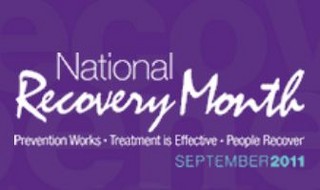September is National Recovery Month in the United States. As the federal Substance Abuse and Mental Health Services Administration puts it Recovery Month "promotes the societal benefits of treatment for substance use and mental disorders, celebrates people in recovery, lauds the contributions of treatment providers, and promotes the message that recovery in all its forms is possible. Recovery Month spreads the positive message that behavioral health is essential to overall health, that prevention works, treatment is effective and people can and do recover."
Nicely, and succinctly, put.
Simply ideas tend to make for movements. And that seems to be the case with Recovery Month. All over the nation events are going on aimed at increasing awareness and, yes, celebrating countless victories.
The JJIE is housed at Kennesaw State University, in metro Atlanta. We had a number of Recovery Month events here and we are fortunate enough to be the home of the Center for Young Adult Addiction and Recovery. Its director, Teresa Johnston, is an expert in the field and a forceful advocate for those in recovery.
Taking advantage of the fact that she is less than a football field away from our offices, we asked Johnston to kindly answer a few question about Recovery Month.
She kindly agreed.
JJIE:This year's National Recovery Month theme is "Recovery Benefits Everyone." Can you expand on that?
Johnston: Recovery benefits everyone because it is a disease that costs society, community and families millions of dollars and heartache if left untreated. The treated addict, the person in recovery gives back to society through service and healthy living, contributing to society.
JJIE:Nationally, what kind of events are part of National Recovery Month? How much of it is aimed at young adults or teenagers?
Johnston: There are national events hosted each week throughout the country and many young adults participate in recovery events through treatment centers, universities, recovery residences, community and other grass roots events. Including joining voices at governmental meetings and gatherings to influence change. Recovery high schools are part of the recovery month as well.
JJIE: The Run for Recovery 5K took place this past Saturday. How successful was it? What kind of impact do you think it had on the community's perception of addiction and recovery?
Johnston: The Run for Recovery 5k was very successful this past Saturday as an outreach to the community bringing treatment centers, recovery residences, the Collegiate Recovery Community, students together to celebrate recovery from addiction. I think it had a positive impact on the community perception of addiction as the run itself was well organized, fun, informative and people were warm and friendly.
JJIE:What other programs or events is the CYAAR organizing/participating in for National Recovery Month?
Johnston: We participated in the Voices and Faces of Recovery national event website by adding our numbers and local voices to a national venue. We are also hosting our September celebration of recovery meeting on campus the third Monday of the month.
JJIE: Recovery Month is only one month. What kinds of things is CYAAR doing the rest of the year to change the public perception of addiction?
Johnson: The Center for Young Adult Addiction and Recovery hosts weekly meetings on campus including AA, NA, ALANON, ANAD and GA. We host monthly speaker meetings open to anyone who wants to learn more about addiction and recovery. One of our goals is to reach out into the collegiate community and the local community to educate people about addiction and healthy choices. We strive to change public perception by acknowledging recovery and addiction services on campus to minimize stigma so that those suffering can get help and those in recovery can find community. We particpate in collaborative research in the addiction prevention, education, intervention and recovery field; studying behaviors, interventions that are successful and recovery that is progressive in order to learn more about how to prevent addiction, help those suffering get help and build a community of recovery in the collegiate population.

VANCOUVER / ADDICTION / HOMELESS / CHAOS / POVERTY
THE HARSH REALITY OF ADDICTION
The producers of this short film are both recovering addicts who have both spent time living and indulging with drug addiction in Vancouver’s Downtown Eastside. Today they are both clean and sober with multiple years of recovery
http://www.archive.org/details/VancouverAddictionHomelessChaosPoverty